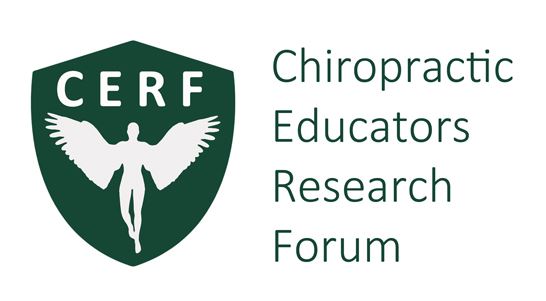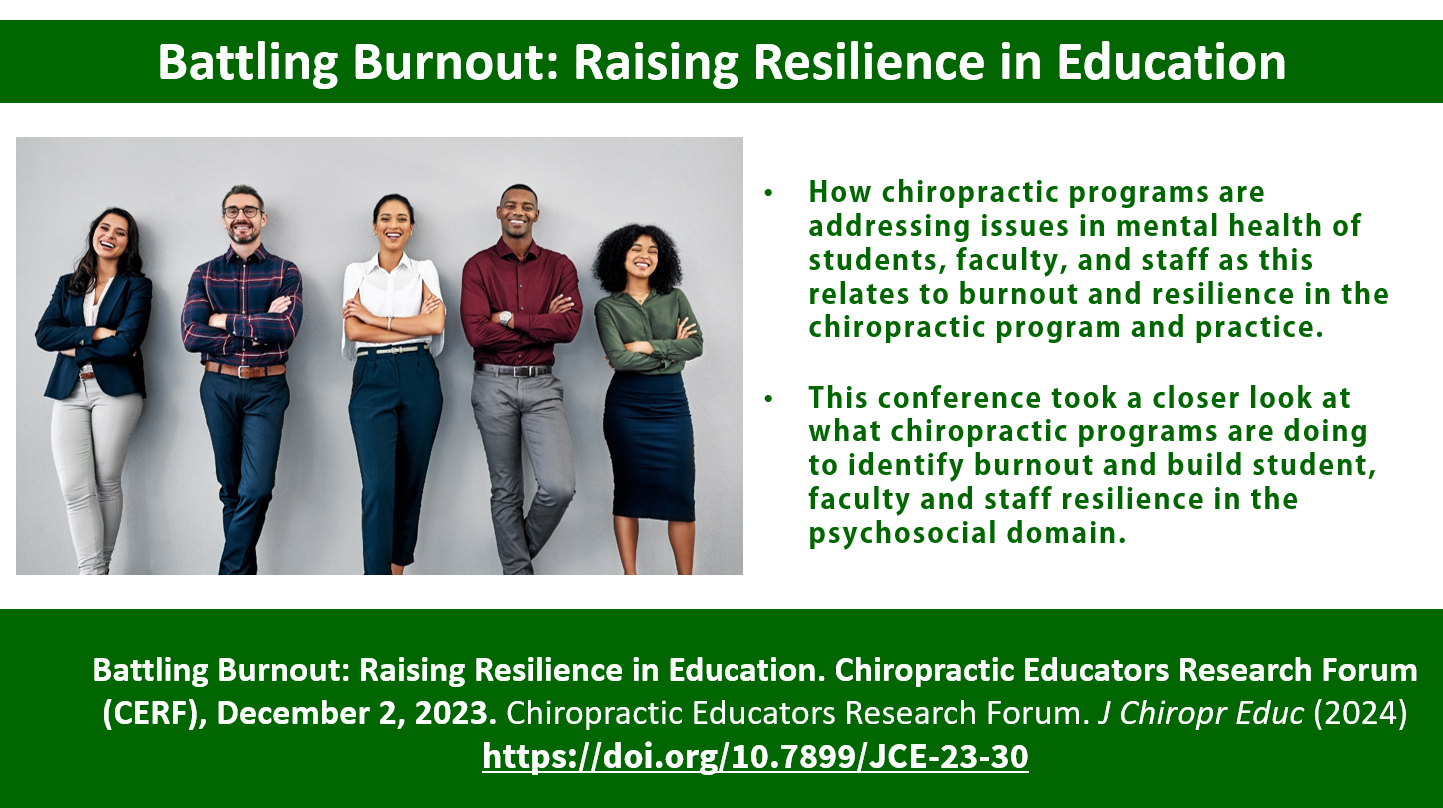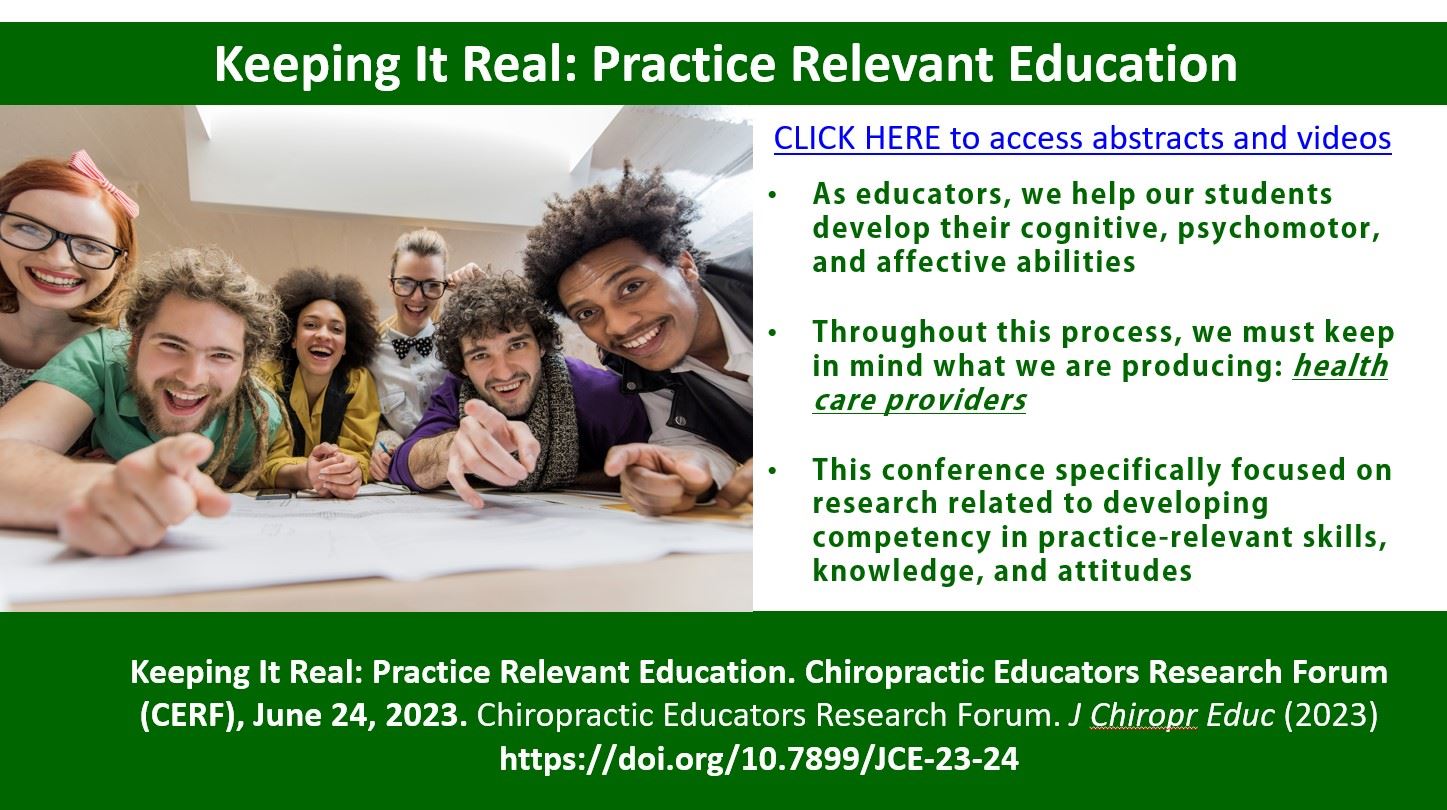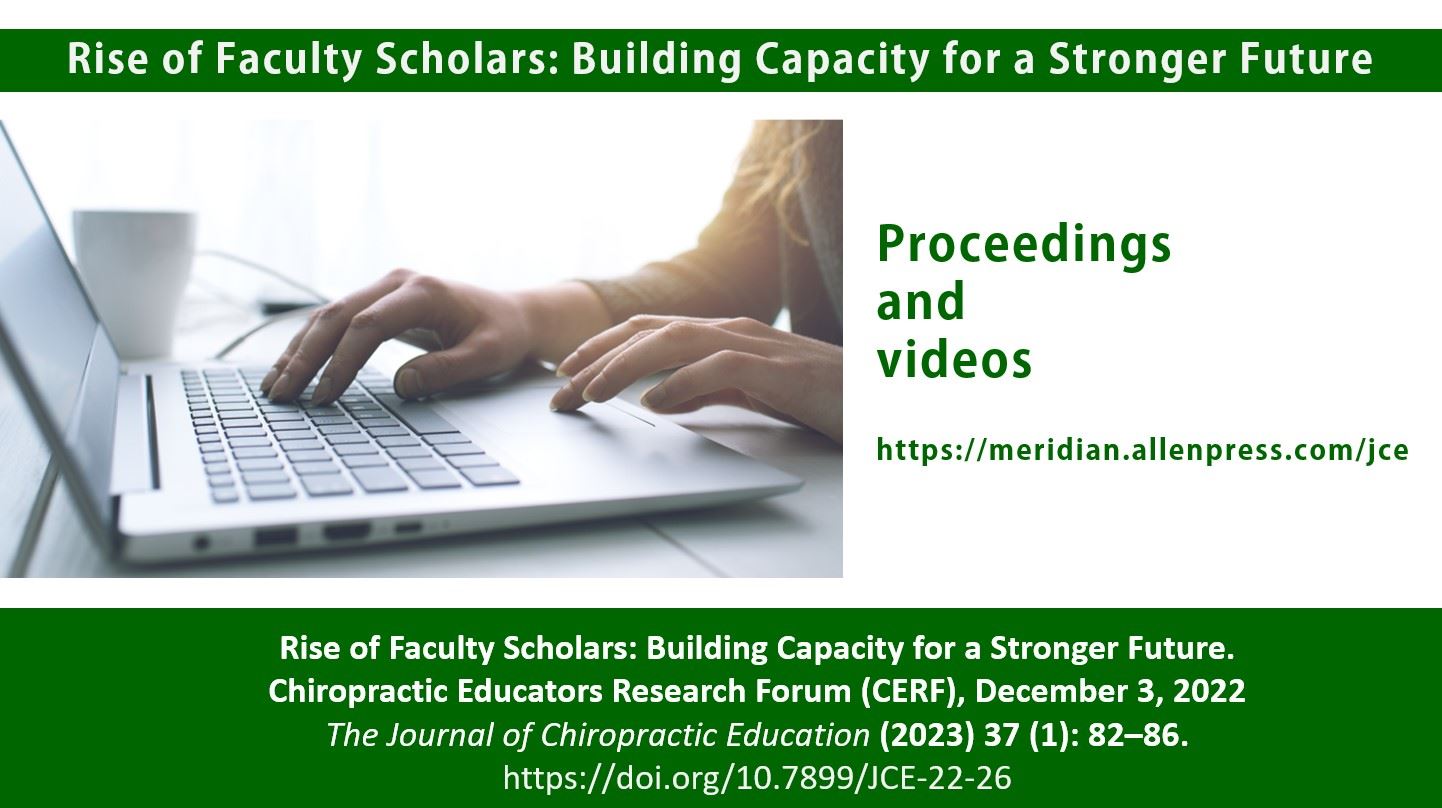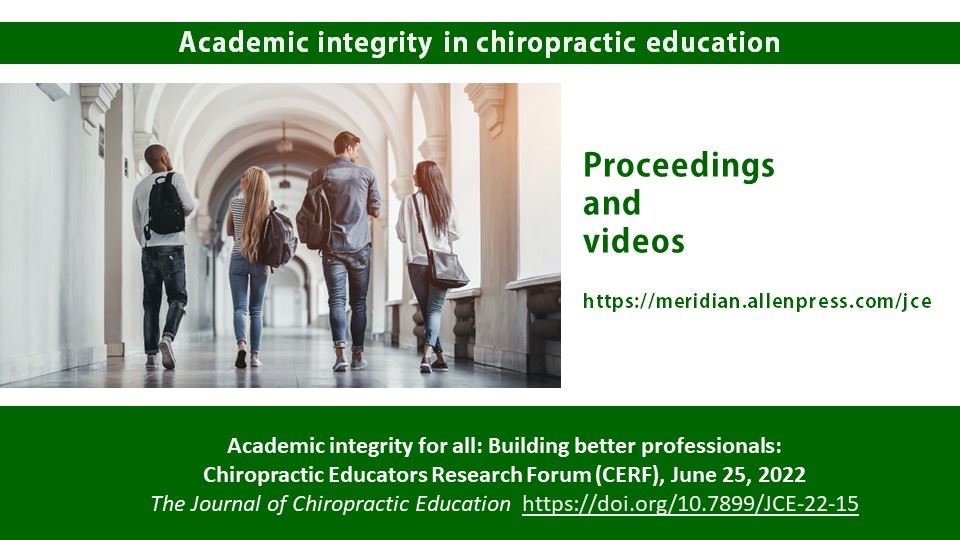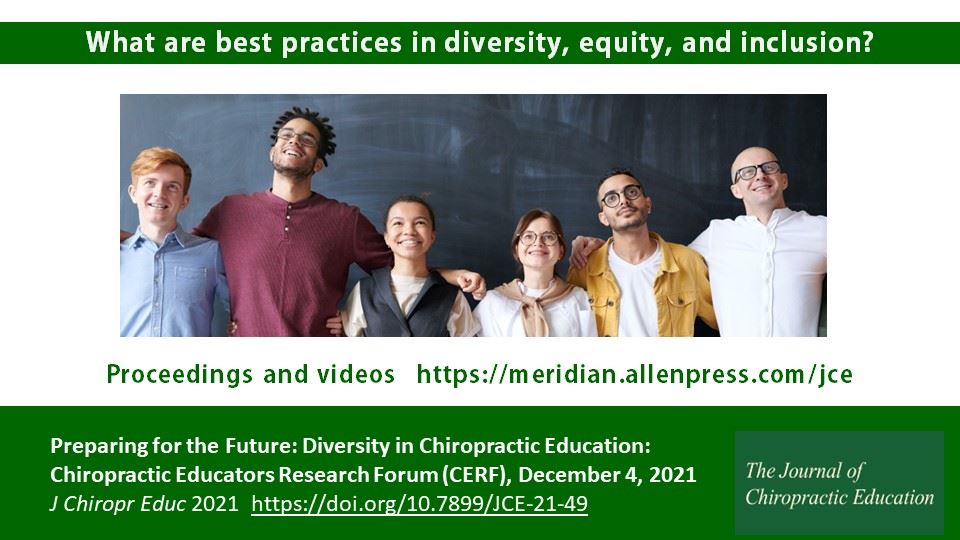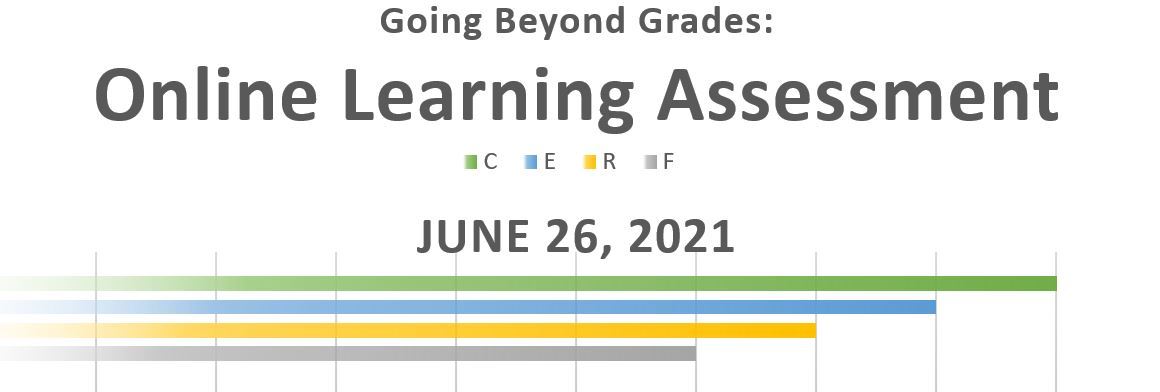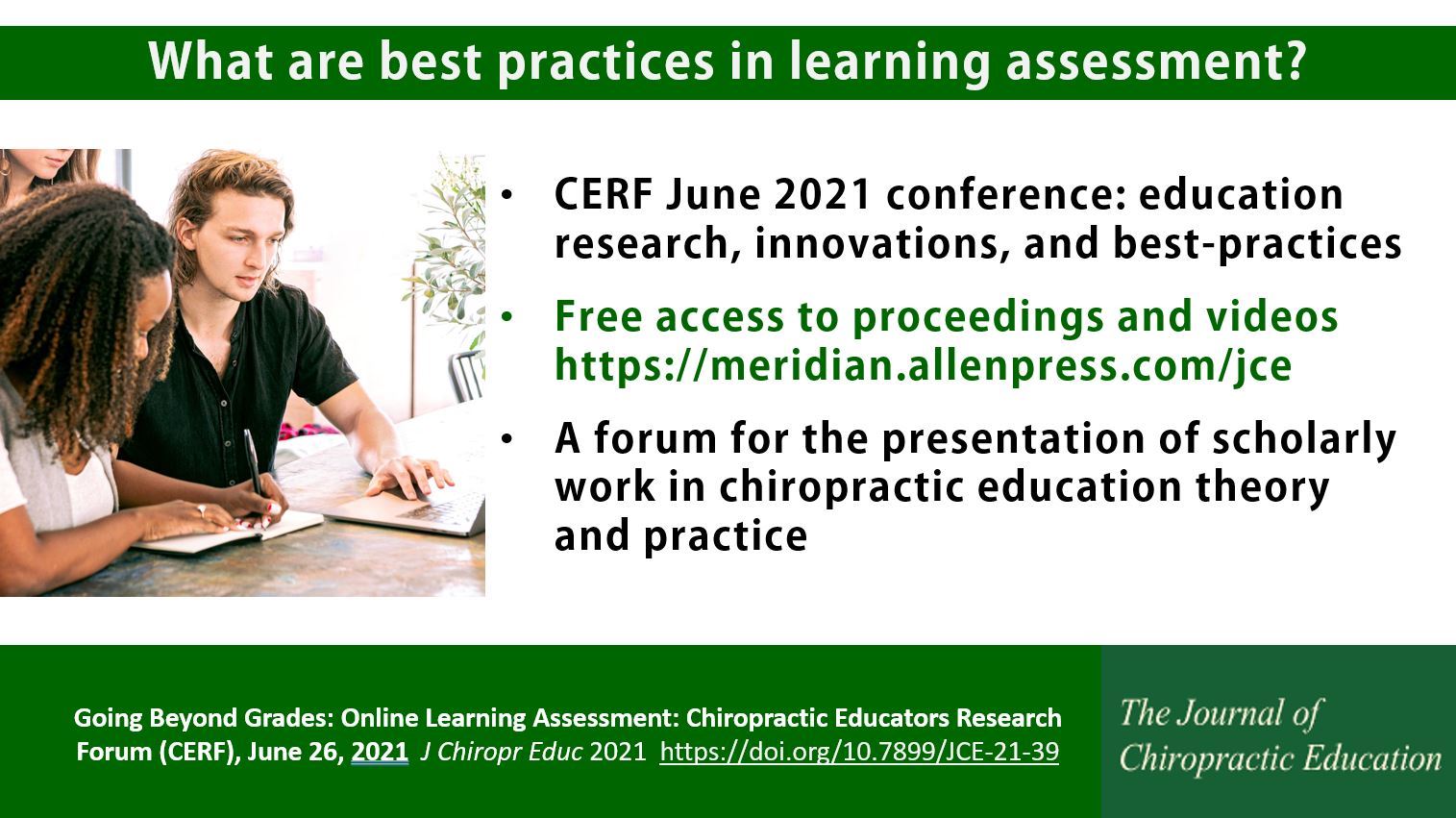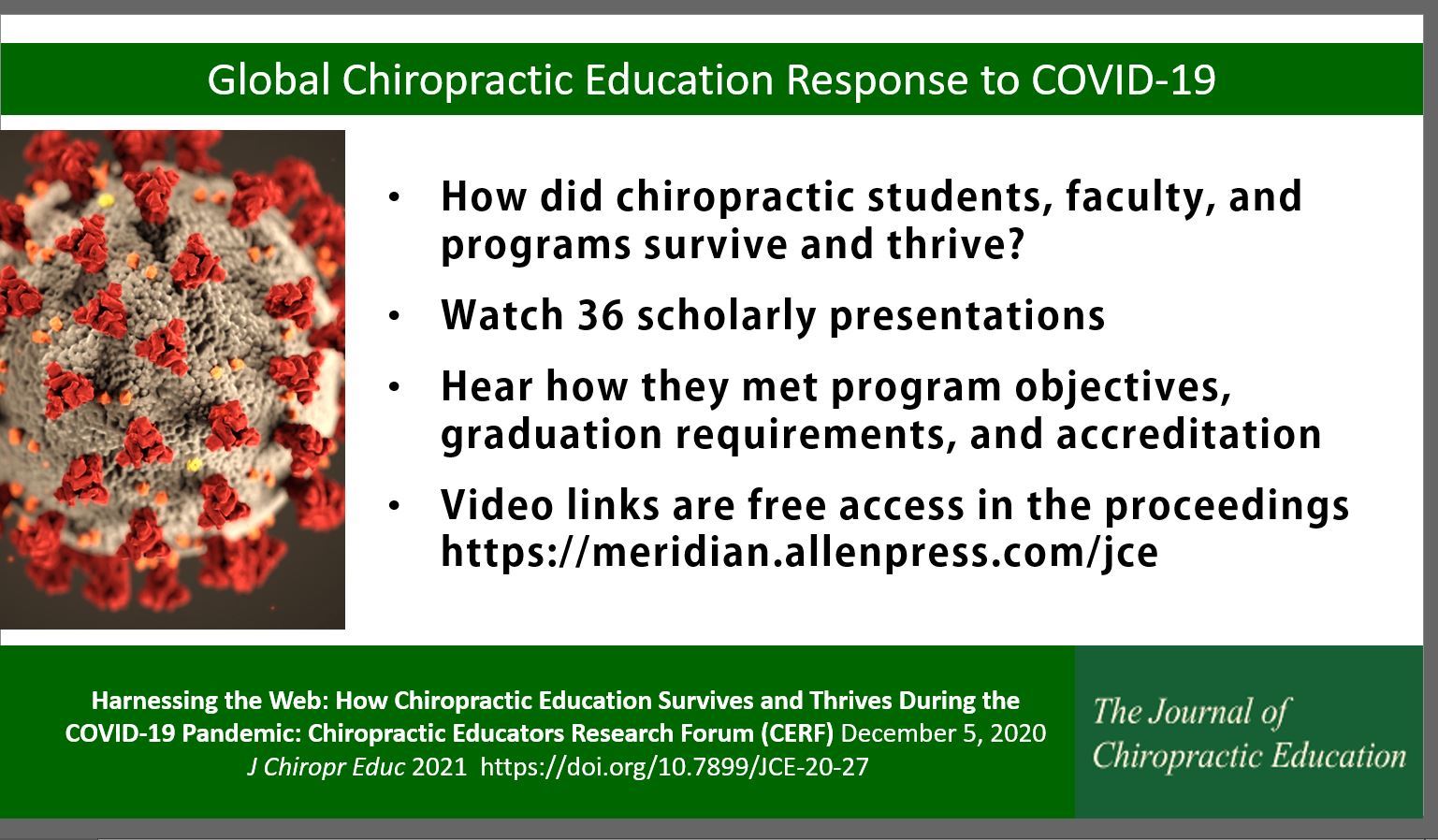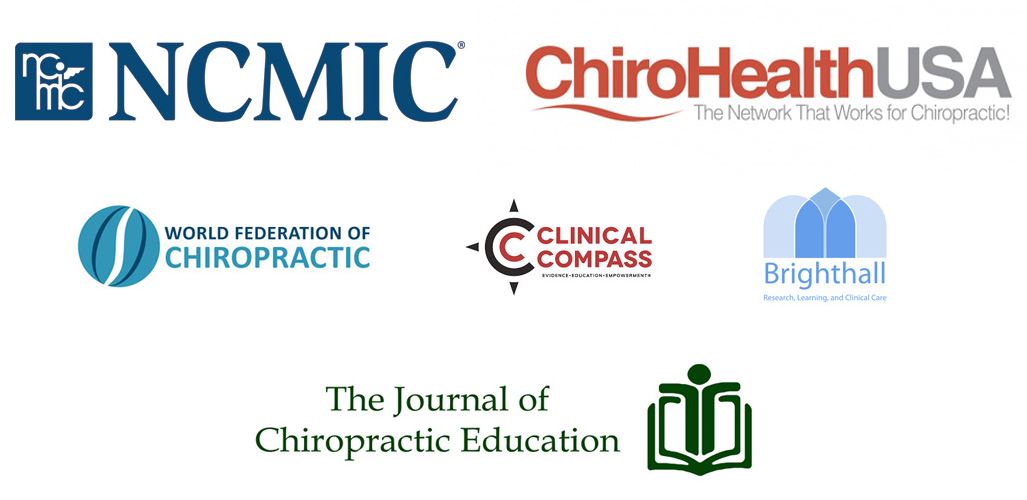Chiropractic Educators Research Forum |
|
|
Prior CERF Events
Click on the links below to access content from these exciting CERF Conferences
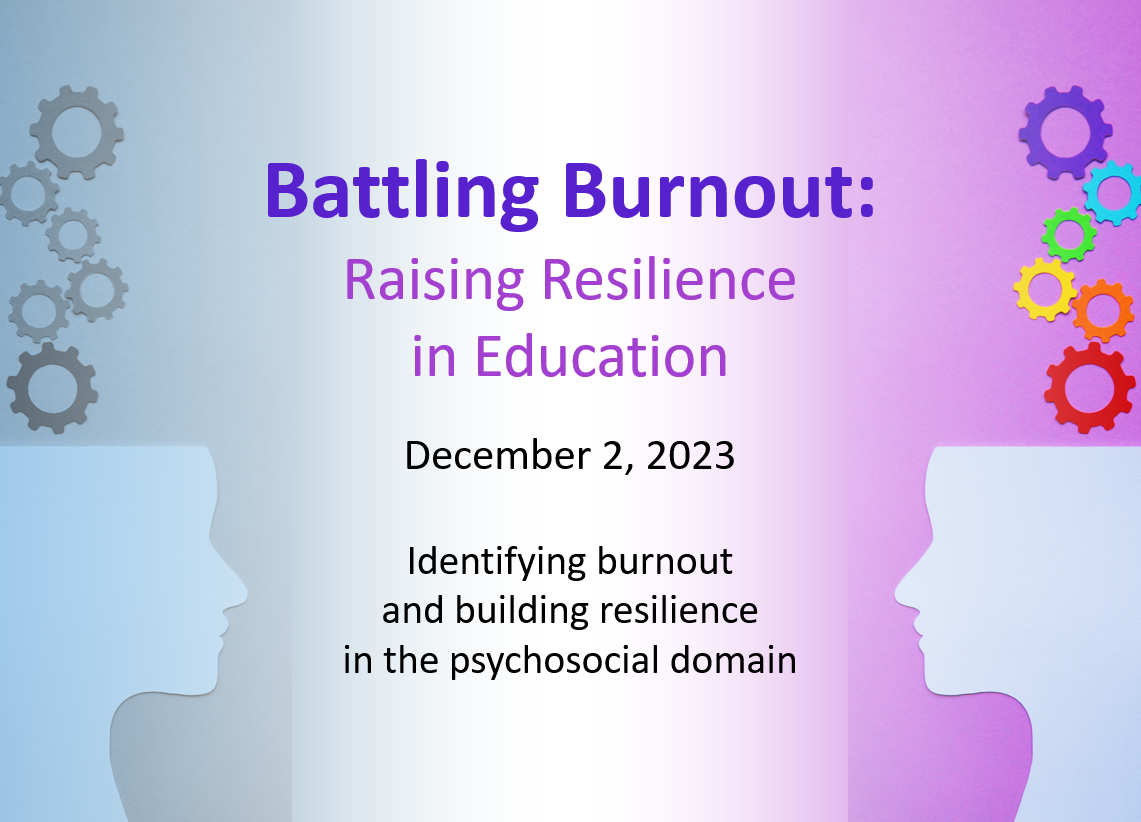
The December 2023 virtual conference Battling Burnout: Raising Resilience in Education focused on research related to how chiropractic programs are addressing issues in mental health of students, faculty, and staff as this relates to burnout and resilience in the chiropractic program and practice. This conference took a closer look at what chiropractic programs are doing to identify burnout and build student, faculty and staff resilience in the psychosocial domain.
Burnout is a “syndrome conceptualized as resulting from chronic workplace stress that has not been successfully managed” (WHO) and interferes with daily activities. Resilience is “the process and outcome of successfully adapting to difficult or challenging life experiences, especially through mental, emotional, and behavioral flexibility and adjustment to external and internal demands.” (APA)
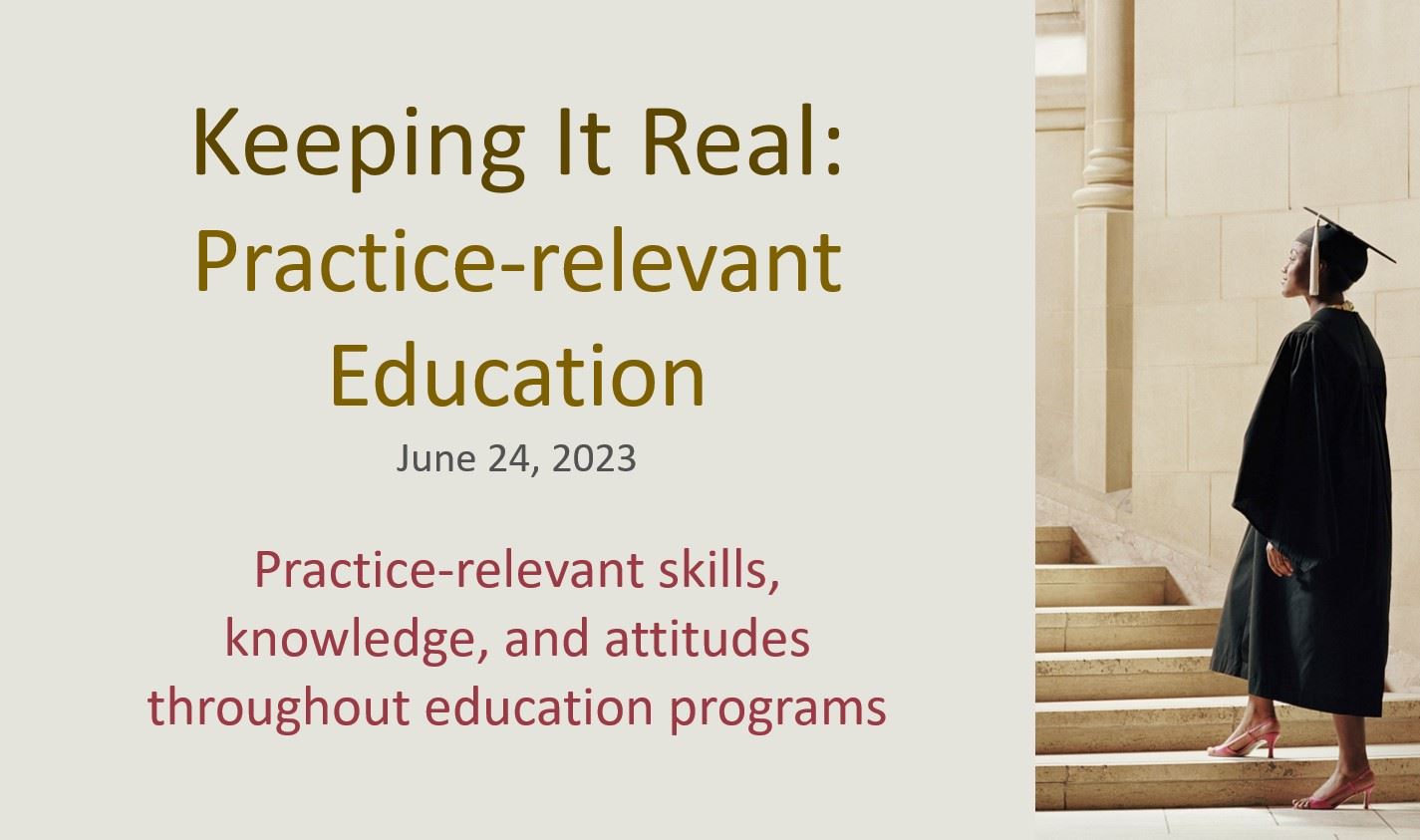
The June 2023 Chiropractic Educators Research Forum (CERF) Conference “Keeping It Real: Practice Relevant Education” specifically focuses on education research related to developing competency in practice-relevant skills, knowledge, and attitudes.
As we help our students develop their cognitive, psychomotor, and affective abilities, we must keep in mind the end product and what we are producing – healthcare providers. Our graduates must demonstrate competency in relevant knowledge, skills, and attitudes to practicing healthcare in a professional and evidence-based* manner. Therefore, integrating practice-relevant skills, knowledge, and attitudes are essential throughout our programs.
* evidence-based = the intersection of best evidence, clinical expertise, and patient’s values.
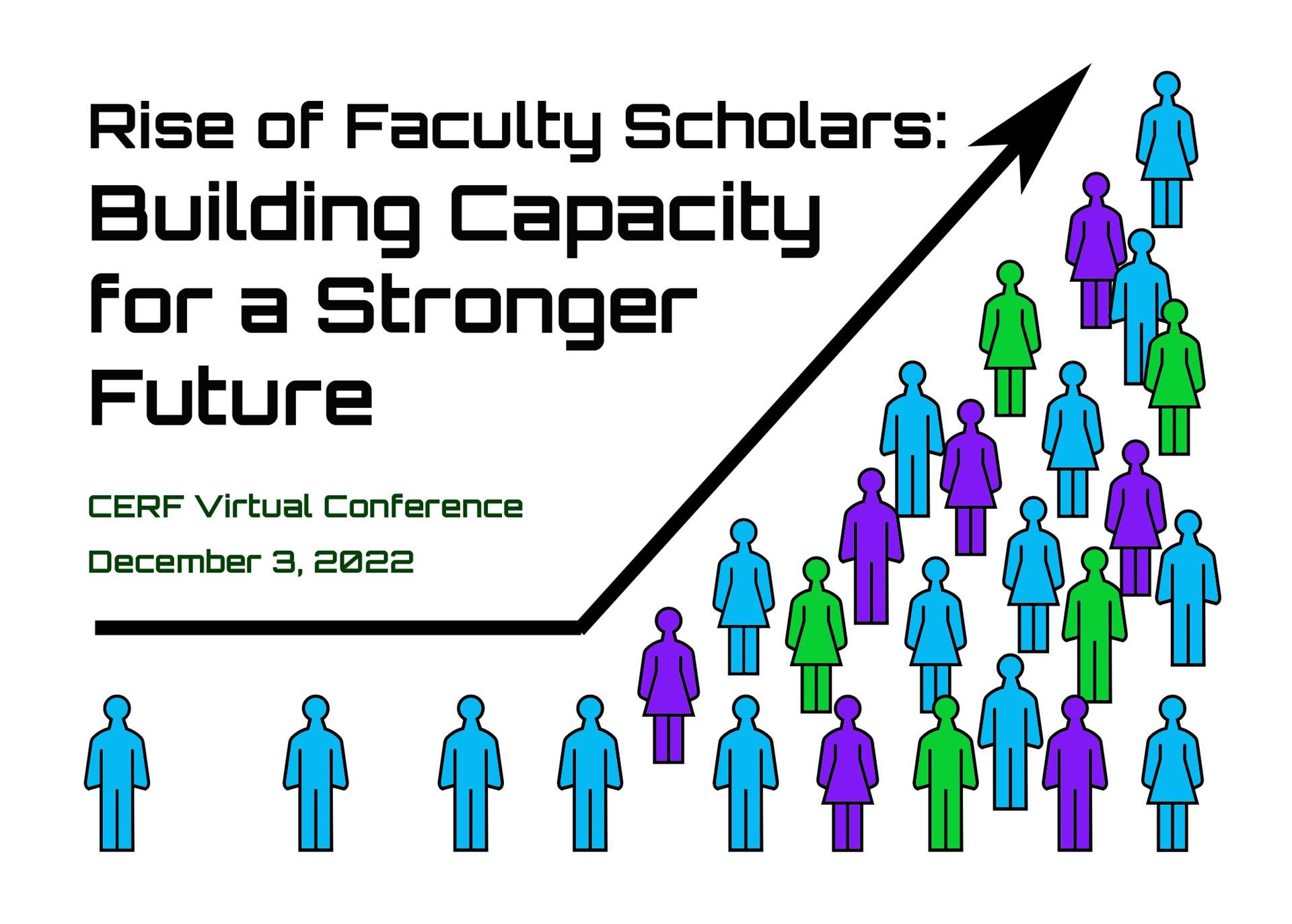
This December 2022 Chiropractic Educators Research Forum (CERF) Conference specifically focused on research related to Building Faculty Scholarship and Research Capacity. Four packed sessions provided a deep dive into education research and research capacity building for educators. Faculty scholarship consists of a variety of activities. Boyer proposed 4 different categories:
1. Scholarship of discovery, which includes original research that advances knowledge.
2. Scholarship of integration, which includes synthesis of information across disciplines, topics, or across time.
3. Scholarship of application and engagement, which involves the application of disciplinary expertise that can be evaluated by peers and shared with others.
4. Scholarship of teaching and learning, which is the systematic study of teaching and learning processes.
During this conference, we took an in depth look at building faculty scholarship and research capacity ranging from examples of education research to how programs are promoting and supporting faculty in doing scholarly activities.
Click the links below to access the content.

This June 2022 Conference specifically focused on research related to academic integrity and professionalism. Academic integrity is fundamental to learning, teaching and research and is the commitment to and demonstration of honest and moral behavior in an academic setting. Therefore, academic integrity is much more than managing the negative side – plagiarism, cheating, misconduct, and dishonesty – but also incorporates promotion of the positive side, which includes improving and maintaining academic standards, developing, and promoting skills and attitudes of honesty, integrity, and professionalism of students, faculty, and graduates. This conference looked at both the negative and the positive aspects of integrity.
If you did not have the chance to attend the research abstract sessions, you will still be able to view the research presentations once the conference proceedings are published in The Journal of Chiropractic Education.
The tutorial sessions focused on academic integrity are posted on the CERF 5-minute mentor page.
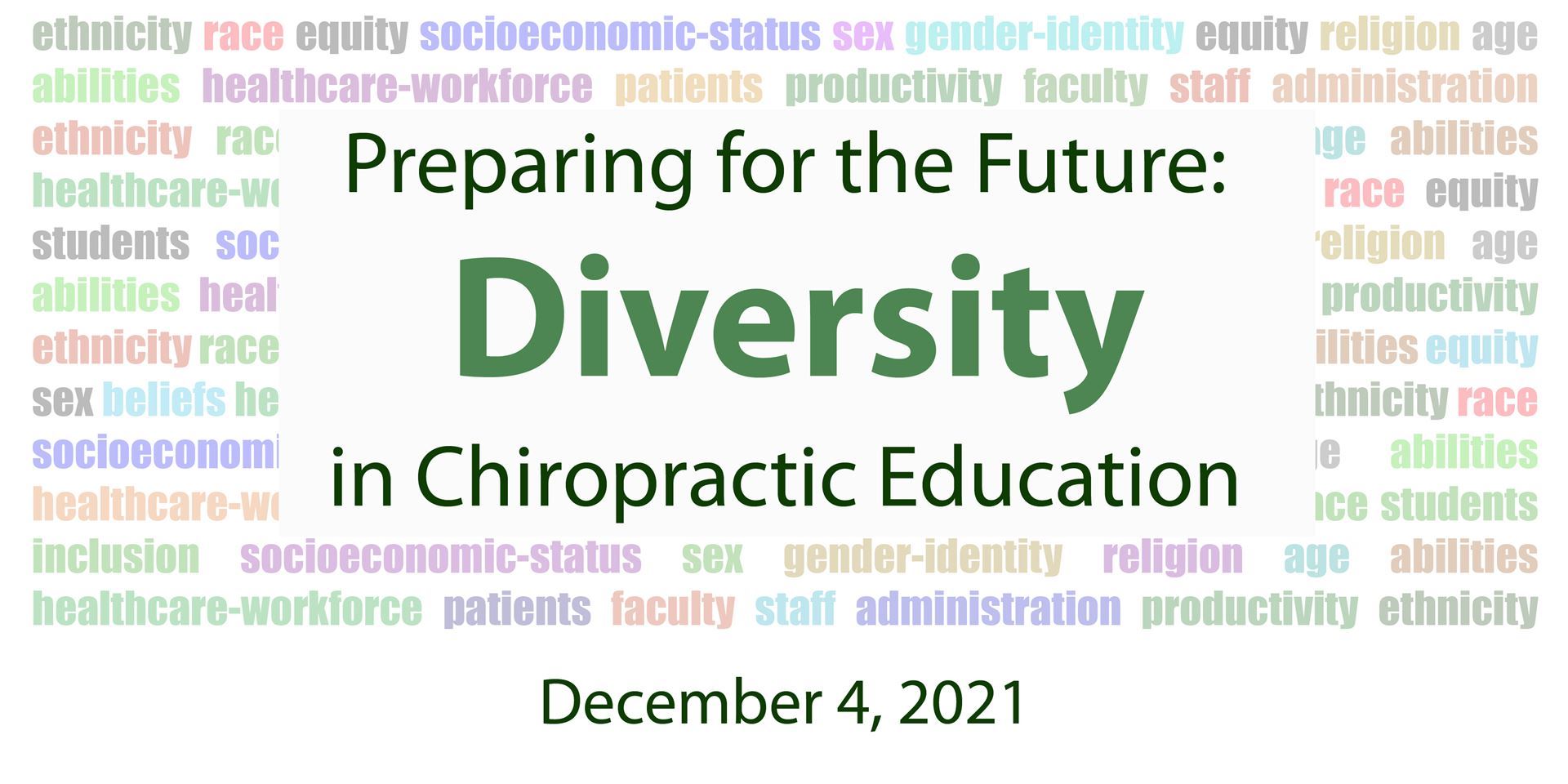
During this CERF conference we aimed to accomplish our mission, which is to build scholarship and research capacity for chiropractic educators throughout the world. On December 4, 2021, we delivered a CERF conference, which spanned 8 hours, and allowing 31 presenters and panelists and approximately 118 registrants to meet.
This December 2021 Conference specifically focused on research related to chiropractic education and diversity, equity, and inclusion. "Diversity goes beyond the tolerance of others. Diversity is our appreciation of differences in ethnicity, race, socioeconomic status, sex, gender identity, religion, age, and abilities (mental, physical) of the members of the health care workforce and the patients we serve" During this meeting, we took an in depth look at how chiropractic programs work to address diversity issues in the changing landscape of healthcare and to address the needs of the world population. Attendees and presenters represented various regions including Australia, Canada, Malaysia, Puerto Rico, Spain, South Africa, United Kingdom, and United States.
If you did not have the chance to attend the research abstract sessions, you will still be able to view the research presentations once the conference proceedings are published in The Journal of Chiropractic Education.
The tutorial sessions focused on diversity, equity, and inclusion are posted on the CERF 5-minute mentor page.
Through this CERF conference we aimed to accomplish our mission, which is to build scholarship and research capacity for chiropractic educators throughout the world. On June 26, 2021, we delivered a CERF conference, which spanned 8 hours, and allowing 35 presenters and panelists and approximately 132 registrants to meet.
This June 2021 Conference specifically focused on research related to chiropractic education and online learning assessment. During this meeting, we took an in depth look at how programs assess learning from a distance, including both summative and formative assessments, either live or asynchronously through technology or the internet. Attendees and presenters represented various regions including Australia, Canada, Spain, South Africa, Sweden, United Kingdom, and United States.
If you did not have the chance to attend the research abstract sessions, you will still be able to view the research presentations. The conference proceedings are published in The Journal of Chiropractic Education.
The tutorial sessions focused on assessment, are posted on the CERF 5-minute mentor page.
 CERF continues to take steps to accomplish its mission, which is to build scholarship and research capacity for chiropractic educators throughout the world. On December 5, 2020, we delivered our first CERF conference, which spanned 12 hours, and allowed 62 authors, 12 invited panelists, 2 keynote speakers and approximately 90 attendees to meet and address how chiropractic has survived and thrived during the COVID-19 pandemic. Attendees and presenters represented various regions including Australia, Canada, Spain, South Africa, Sweden, United Kingdom, and United States. This CERF conference provided a platform for 36 scholarly presentations and 6 panel discussions that focused on the effects of the pandemic on chiropractic education. During this meeting, we took an in-depth look at how programs worked to meet program objectives, graduation requirements, accreditation, and other activities. Everyone was buzzing with excitement and were delighted in seeing what others in chiropractic education were doing about COVID-19. If you did not have the chance to attend the sessions, you will still be able to view the research presentations in the conference proceedings that are published in The Journal of Chiropractic Education. |
Keynote presentations December 5, 2020
